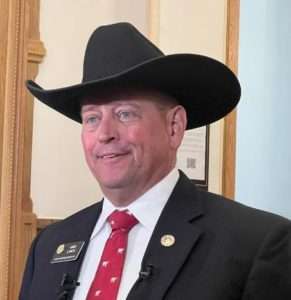 March 28, 2023 12:48 PM UTC
March 28, 2023 12:48 PM UTC

The biggest political news of the last week in Colorado has been the end after weeks of increasing obstruction by the Republican micro-minority in the Colorado House of the Democratic supermajority’s patience–leading to the invoking this past weekend of the body’s longstanding Rule 14 to limit debate on an individual piece of legislation, thus putting a hard cap on the minority’s ability to filibuster.
Last night, 9NEWS’s Marshall Zelinger delved a little deeper into the circumstances leading up to Democrats using the so-called “nuclear option” to put an end to endless stall tactics from a GOP minority with no power to stop these bills from passing. As it turns out, House Minority Leader Mike Lynch had been in the process of leveraging his minority’s obstruction into concessions on some of the proposed legislation in negotiations with Democratic leadership. Had that effort been successful, Republicans could have called their whole obstructive effort a win for gun rights. But it was not to be:
“We had a few deals on the table to stop the filibuster on that bill,” [Rep. Javier] Mabrey said.
“One was to change some of the language that made the standard of proof a little higher for someone that was taking on these lawsuits. The other was to cut out the conceal portion of it, so if somebody has a product that helps conceal a gun, then they would be cut out of it,” said House Minority Leader, State Rep. Mike Lynch, R-Wellington…
“Of the 50-plus amendments that we had, we had distilled it down to three that they could agree with, and we could agree with,” Lynch said. “This was substantive changes that really did help industry here in the state.” [Pols emphasis]
When Republican lawmakers refused to stop unlimited debate, the Democrats used Rule 14, which limits debate.
How does Lynch explain the failure of his own caucus to fall in line?
“How that went down on our side is somewhat irrelevant, but we had folks that wanted more out of the deal,” Lynch said. “I’ve learned from my leadership training throughout the years, it’s never good to throw your own team under the bus. That is a leadership challenge for me to take care of and I plan on doing that. [Pols emphasis] We’re not going to lose any good deals like that, I will say.”
Obviously, the failure of the Republican caucus to abide by the agreement made by their Minority Leader is extremely relevant, and the real “leadership issue” that Lynch faces rather than not throwing his “own team under the bus.” If Minority Leader Lynch has no authority to enforce agreements with his caucus, there is simply no point for majority Democrats in negotiating with Lynch. Zelinger and 9NEWS host Kyle Clark summed up the problem at the end of the video clip you can watch above:
Kyle Clark: Nobody envies Mike Lynch’s job. The dude has got the smallest caucus in Republican history at the Capitol, and he can’t keep them in line. He’s got people going rogue on him.
Marshall Zelinger: He doesn’t say rogue, he says everyone is their own person, they all have their own ideas, they’re all elected individually. But it is his job, if you’re going to negotiate something like this, it’s his job to be like “Look, we got these things that they didn’t have to give us. But we’ve got to do this,” and that means stop talking. And if someone doesn’t want to stop talking, why would the Democrats be then like “let’s hear you out for this next bill?”
Clark: Yeah. Instead of a caucus of like a dozen, it’s like a caucus of one. Caucus of one. Caucus of one. [Pols emphasis]
By holding together after extracting everything they possibly could from their filibuster in terms of both base-pleasing grandstands and measurable policy changes, Republicans could have emerged from this fracas claiming a measure of victory.
Instead, it’s a lesson in how to reduce what little influence you have left to no influence at all.
Subscribe to our monthly newsletter to stay in the loop with regular updates!
Comments